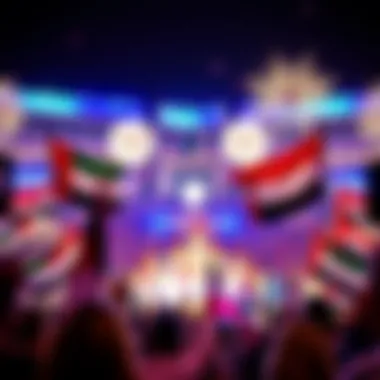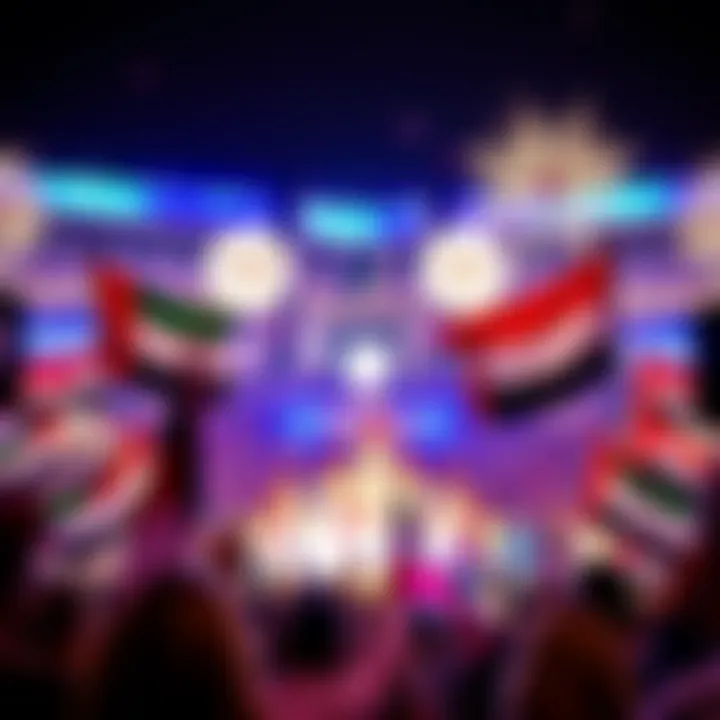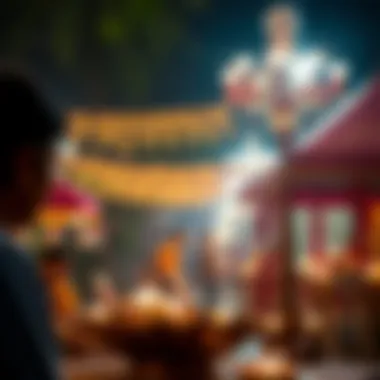Exploring Public Holidays in the UAE: Cultural Insights


Intro
Public holidays in the United Arab Emirates are not simply days off from work; they embody the rich tapestry of Emirati culture, heritage, and religious significance. Each holiday tells a story and offers insights into the values and traditions that shape the nation. From the glimmering skyscrapers of Dubai to the serene dunes of Abu Dhabi, these celebrations resonate across all emirates, yet each emirate might celebrate them in its own unique way. Moreover, public holidays also have a profound impact on tourism and business operations, creating both challenges and opportunities for various sectors.
In this article, we'll take a closer look at the public holidays in the UAE, dissecting their cultural roots and implications in today’s dynamic environment. Understanding this intricate landscape is vital for anyone interacting with or doing business in the UAE, highlighting the need for cultural sensitivity and adaptability.
This exploration begins with a thorough examination of the major public holidays, their historical contexts, and how they shape current social and economic interactions within the UAE. Holistically, this guide aims to assist investors, businesses, and anyone interested in grasping the significance of these holidays in a region that is both modern and deeply traditional.
Cultural Significance of Public Holidays
Public holidays in the UAE serve as a bridge connecting the past with the present, reflecting both Islamic traditions and local customs. Eid al-Fitr and Eid al-Adha are prime examples that celebrate significant religious events in the Islamic calendar. These holidays foster a sense of community, encouraging families to come together and partake in festivities that include feasting, giving back to the less fortunate, and sharing good wishes.
Other holidays, such as UAE National Day, celebrate the union of various emirates, emphasizing national pride and identity. It is an opportunity for residents and citizens alike to reflect on the rapid development of the UAE and celebrate milestones achieved as a nation.
As we delve deeper, we'll explore how these holidays impact day-to-day life in the UAE, particularly from a business perspective.
Impact on Business Operations and Tourism
The occurrence of public holidays has significant implications for businesses and travelers. During holidays, many companies close or operate on reduced hours, which can disrupt regular operations. This requires strategic planning from companies looking to minimize downtime and capitalize on holiday-driven consumer behavior.
For tourism, public holidays present unique windows for visitors to engage with Emirati culture. Tourists are often drawn to events and festivals that showcase local heritage, providing them a chance to participate in traditional dances, food fairs, and fireworks displays. Yet, the influx of tourists during popular holiday seasons can lead to increased traffic and a surge in demand for accommodations and services, presenting both challenges and lucrative opportunities for the hospitality and service industries.
Public holidays in the UAE not only offer invaluable insights into the region’s cultural landscape but also shape its economic framework. Understanding them can open doors for better planning.
Through this lens, we can appreciate how public holidays in the UAE blend cultural significance with socio-economic dynamics, creating a vibrant environment that both honors tradition and embraces modernity.
In the upcoming sections, we will provide a chronological overview of key public holidays, shedding light on their historical roots and the practical implications for businesses and individuals navigating through the UAE's unique landscape. This understanding is essential for any stakeholder wishing to thrive in this diverse region.
Prelims to Public Holidays in the UAE
Public holidays in the United Arab Emirates are much more than just days off from work; they're a critical thread woven into the rich tapestry of Emirati culture. Understanding these holidays is essential not only for residents but also for investors, expatriates, and anyone engaged in a business within this rapidly evolving landscape. These occasions provide insight into the values held dear in UAE society and highlight the diverse heritage that shapes the nation today.
Defining Public Holidays
In the UAE, public holidays can be categorized into several types: national holidays, religious observances, and other recognized celebrations. National holidays typically commemorate landmark events in the country’s history, such as UAE National Day, which marks the unification of the emirates. On the flip side, religious holidays like Eid al-Fitr and Eid al-Adha are determined by the Islamic calendar and hold deep spiritual significance.
Public holidays in the UAE are declared by the federal government and can vary slightly from emirate to emirate. They often bring communities together, transcending different cultures and backgrounds. These observances invite participation from all, fostering a shared sense of belonging and pride for both Emiratis and expatriates alike.
Importance of Holiday Observance
Public holidays serve various crucial roles in the UAE. From a socio-cultural perspective, they reinforce community bonds and offer people a chance to step back from the hustle and bustle of daily life. The collective celebrations and events during these holidays are poignant reminders of shared values, aspirations, and heritage. In a country known for its incredible diversity, holidays act as unifying moments that invite people from differing backgrounds to partake in cultural festivities.
Moreover, these holidays significantly impact business operations across various sectors, including retail, hospitality, and tourism. Understanding when these holidays occur is imperative for businesses aiming to optimize their strategies, whether that's adjusting working hours or launching promotional sales geared toward holiday shoppers.
"Public holidays in the UAE are a reflection of the country’s identity, they are markers of celebration, remembrance, and the preservation of cultural heritage."
In summary, grasping the intricacies of public holidays in the UAE offers an informed perspective on how these dates are celebrated and their wider implications. For investors and professionals navigating this vibrant market, acknowledging the significance of these observances can ultimately contribute to a deeper appreciation of the Emirati context.
Types of Public Holidays
Understanding the types of public holidays in the UAE is crucial for both residents and visitors. These holidays not only reflect the nation's cultural and religious values but also impact business operations, social interactions, and tourism strategies. By recognizing the various categories of holidays, stakeholders can navigate this diverse landscape with a nuanced perspective, leading to more informed decisions in their personal and professional lives.
National Holidays
National holidays in the UAE celebrate significant events in the history of the nation. These holidays foster a sense of unity and pride among Emiratis, creating an opportunity for both reflection and celebration.
- Key National Holidays include:
- UAE National Day – Celebrated on December 2nd, this day marks the unification of the seven emirates in 1971. It serves as an occasion for national pride and showcases the achievements of the UAE through numerous festivities.
- Commemoration Day – Observed on November 30th, this day honors the sacrifice of Emirati soldiers who gave their lives for the country. It is a solemn reminder of the bravery and commitment shown by these individuals, often marked by public ceremonies and moments of silence.
These holidays play a pivotal role in reinforcing national identity and cultural heritage, laying the foundation for community cohesion.
Religious Holidays
Religious holidays hold profound significance, particularly for the Islamic faith, and are deeply embedded in the social fabric of the UAE. These observances allow families and communities to come together in celebration and reflection.
- Eid al-Fitr – Marking the end of Ramadan, this holiday is characterized by prayer, feasting, and acts of charity. Families often gather to celebrate the end of fasting and give back to their communities, creating a spirit of generosity and communal bonds.
- Eid al-Adha – This holiday commemorates the willingness of Ibrahim to sacrifice his son. It's a time of sacrifice, marked by a festive spirit where families share meals and distribute the meat from sacrificed animals to the less fortunate. Activities encompass prayers, family gatherings, and cultural events.
- Islamic New Year – While not as widely celebrated as Eid, it holds its own significance. The day is typically spent in reflection and is an opportunity to prepare for the coming year spiritually and personally.
These holidays are not just observances; they are profound experiences that reinforce cultural values and create a sense of belonging.
Other Recognized Holidays
Besides national and religious holidays, the UAE recognizes several other significant observances that highlight both cultural diversity and international relations.
- International Workers' Day – Celebrated on May 1st, this holiday acknowledges and honors the contributions of workers across various sectors. It's a testament to the labor force's role in building the UAE's economy, integrating residents from myriad backgrounds.
- UAE Heritage Day – Observed on March 18th, this day celebrates Emirati culture, traditions, and history. Events often showcase traditional arts, crafts, and performances, highlighting the country's rich heritage.
These holidays offer additional layers of meaning, showcasing the UAE's commitment to honoring diversity and its growth as a nation.
Understanding these holidays allows individuals and businesses to align their operations and engagements, fostering respectful and meaningful interactions within the community.
Overview of National Holidays


Public holidays in the UAE hold significant meaning and serve various purposes within the context of the nation’s identity and culture. They act as a bridge, connecting historical events with contemporary society, while also providing a chance for citizens and residents alike to reflect on their heritage. Understanding these holidays goes beyond merely knowing the dates; it’s about grasping their roles in fostering national unity and pride.
The UAE is a melting pot of cultures, and public holidays reflect this diversity. Each holiday celebrated carries particular stories and customs that resonate with the people. By examining these observances, one gains a deeper insight into the social fabric of the country, where different communities intertwine seamlessly. This exploration sheds light on the values that the UAE holds dear, such as respect, gratitude, and celebration of achievements.
UAE National Day
Historical Significance
UAE National Day marks the unification of the seven emirates in 1971, which is a pivotal moment in the country's history. By commemorating this day, the nation honors its journey from individual emirates to a cohesive state. This historical milestone symbolizes resilience and cooperation among the emirates, showcasing their collective ambition to build a prosperous future.
The key characteristic of this celebration is its embodiment of the spirit of togetherness. Residents, regardless of their background, come together to remember and celebrate the progress achieved. The emotional weight carried by National Day lies in its ability to unite various communities within the UAE, fostering a sense of belonging and identity.
A unique feature of National Day is the vibrant parades and fireworks. These events light up the sky and the hearts of people, reminding them of the nation's achievements in just a few decades. While the day itself predominantly emphasizes national pride, some may find the large crowds and festivities overwhelming, posing challenges in managing safety and order.
Celebration Activities
The celebration activities dedicated to UAE National Day are rich in tradition and creativity. One common aspect is the display of the UAE flag everywhere, from homes to government buildings. Events such as joyous parades, cultural performances, and fireworks create an atmosphere full of energy and pride.
These activities not only serve to entertain but also educate individuals about their rich heritage and achievements. Engaging in communal events helps to strengthen the ties among residents, instilling a greater understanding of each other's cultures. The involvement of various communities in the festivities showcases the UAE's commitment to inclusivity.
While the spectacular nature of the celebrations is undeniably attractive, it can also prompt logistical concerns. For example, traffic congestion is a common occurrence during parades, which might mar the experience for some participants. Nonetheless, the spirit of camaraderie and celebration often overshadows these inconveniences.
Commemoration Day
Recognition of Martyrs
Commemoration Day serves as a solemn reminder to honor those who have sacrificed their lives for the UAE. This day represents the nation's acknowledgment of its heroes, fostering a deep sense of respect and gratitude among its residents. Recognizing the contributions of these individuals is crucial, as it cultivates a culture of appreciation and respect.
The key characteristic of this observance is its reflective nature. It is an opportunity for citizens to engage in mourning, celebration of life, and remembrance, emphasizing the importance of bravery and sacrifice. The act of remembering martyrs creates a collective consciousness, ensuring that their deeds do not fade from public memory.
A unique aspect of Recognition of Martyrs is the range of activities, including memorial services and moments of silence observed across the country. This aspect allows people to reflect on the significance of these sacrifices intimately. However, some individuals may find this day emotionally challenging to navigate.
Public Observances
Public observances during Commemoration Day often involve ceremonies at military cemeteries and national monuments. These gatherings create an environment of solidarity, as people come together to pay respect.
The presence of official figures and community leaders during these observances highlights the importance of collective remembrance. Engaging in these events not only honors the fallen but also reinforces the values embedded in Emirati society.
A notable feature of these observances is the inclusion of cultural performances that inspire unity among residents. Although the solemnity of the occasion might deter some from participating, most embrace this day to honor the spirit of the nation. Furthermore, this inclusion of collective activities demonstrates the country's commitment to remembrance and national pride.
The reflections inspired by these national holidays ultimately enhance the understanding of what it means to be a citizen of the UAE. Through events like UAE National Day and Commemoration Day, the rich tapestry of history, culture, and values becomes clear, allowing individuals to appreciate their place within this vibrant society.
Religious Holidays: An Insight
Public holidays in the UAE hold a significant cultural and societal role. Religious holidays, in particular, serve as a reflection of the nation’s Islamic roots and its values. These holidays are not merely days off from work; they symbolize faith, community, and a deep-seated respect for traditions. The unique observances during these periods foster unity, making them a cornerstone of the UAE's social fabric. Understanding these holidays provides insight into the cultural authenticity of the region and the lifestyle of its residents.
Eid al-Fitr
Significance and Customs
Eid al-Fitr, often referred to simply as Eid, marks the end of Ramadan. This holiday is steeped in religious and cultural significance, as it celebrates the conclusion of a month of fasting, reflection, and pious devotion. One of the key characteristics of Eid al-Fitr is the communal prayer that takes place in mosques and open areas, embodying the essence of togetherness and gratitude to Allah.
Why is this significant? This celebration emphasizes community ties, as families often come together to share meals and gifts. A unique feature here is the practice of giving Zakat al-Fitr, a form of charity meant to purify the fast and support those in need. It's a beneficial choice for highlighting the commitment of Muslims to their faith and responsibilities to society. However, the emphasis on expensive gifts or lavish meals can sometimes overshadow the original intent of humility and charity.
Community Celebrations
Community celebrations during Eid al-Fitr are vibrant and filled with joy. Markets overflow with goods, and streets are adorned with decorations. A significant aspect of these festivities is the communal meals where people share traditional dishes, which fosters social interaction and friendship among diverse communities.
What makes these celebrations appealing? They present an opportunity for cultural exchange, as expatriates are often invited to join in the festivities. Each year, unique events arise, from public concerts to fireworks, showcasing the UAE’s multicultural society. However, the level of participation can vary among different emirates, leading to disparity in how the holiday is experienced regionally.
Eid al-Adha
Religious Observances
Eid al-Adha, also known as the "Festival of Sacrifice," is another cornerstone of Islamic tradition, commemorating the willingness of Ibrahim (Abraham) to sacrifice his son as an act of obedience to God. This solemnity is reflected in practices such as the sacrifice of animals, which is shared among families and the less fortunate. This practice reinforces the values of charity and gratitude, echoing across the nation's culture.
The ritual observances, including attending prayers and reading the Quran, signify the deep-rooted faith prevalent in the UAE. While this is a beneficial practice fostering spiritual growth, it also involves logistical considerations, as managing the sacrifices requires foresight and planning from both families and local authorities.
Cultural Activities
Cultural activities during Eid al-Adha go beyond the religious observance. They form a bridge between faith and national identity, showcasing traditional music, dance, and art exhibitions. Local communities engage in cultural presentations that highlight the value of unity amidst diversity.
What sets these activities apart? They serve both educational and entertaining purposes, allowing individuals to connect with their heritage while also celebrating their identity. However, coordinating such activities can pose challenges, particularly in urban areas where public spaces may be limited.
Islamic New Year
The Islamic New Year, or Muharram, marks the beginning of the lunar calendar in Islam. Although not as widely celebrated as Eid, it holds considerable religious significance, particularly in reflecting on personal growth and the community's aspirations for the upcoming year. Observances vary, with some choosing to commemorate it through quiet reflection while others engage in community prayers and gatherings.
Understanding these religious holidays is crucial for anyone interested in the societal dynamics of the UAE. They present moments for introspection, communal bonding, and cultural richness. In addition, these observances help individuals—both residents and foreigners—navigate their experiences in the UAE while supporting a deeper appreciation for its values.
Holiday Variations Among Emirates


Public holidays in the UAE are not just days off; they create a tapestry of cultural differences and unique practices across various emirates. Understanding these variations allows one to appreciate how regional identity plays into the broader emirate culture. Each emirate, while unified under the UAE banner, showcases its own distinctive flair during celebrations, reflecting its demographic composition and local traditions. This exploration of holiday variations helps investors, businesses, and residents to navigate the socio-economic landscape more smoothly, strengthening community ties and promoting inter-emirate collaboration.
Dubai's Unique Observances
Local Festivities
Dubai stands out in its observance of public holidays thanks to its vibrant local festivities. During major occasions like UAE National Day, the city transforms into a hub of colorful parades, fireworks, and cultural displays which create an atmosphere that truly represents the spirit of this modern metropolis. One key characteristic of these local festivities is their ability to attract not just residents but tourists as well, creating a melting pot of cultures celebrating together.
Moreover, events such as the Dubai Shopping Festival, which sometimes coincides with national holidays, showcase local heritage while also boosting economic activity. This dual impact is essential as it enhances community morale and contributes positively to the local economy. The inclusive nature of these local festivities extends the invitation beyond Emiratis to expatiates, fostering unity amongst diverse populations.
However, some may find the crowds overwhelming during such events, and businesses must prepare to manage not just customer inflows but also an increased demand for services during peak periods. The celebration often means higher foot traffic, which can be both an advantage and a challenge for local businesses.
Business Implications
The public holidays in Dubai also hold significant business implications. Companies often realize that holiday celebrations can lead to shifts in workplace dynamics and operational efficiency. While many businesses take a break during holidays, some sectors, like tourism and hospitality, witness a spike in activity, making them crucial for local business economics.
A key trait of these business implications is the need for flexible work hours. Companies catering to festive high seasons may have to adjust their schedules, which benefits overall productivity. For example, during Ramadan and Eid, it’s common for businesses to adjust their working hours, which can create opportunities for greater customer engagement during festive shopping or dining experiences.
Yet, this adaptability comes with drawbacks, as constant changes can sometimes confuse employees and affect morale. Thus, finding the balance between holiday observance and maintaining operational needs becomes vital for businesses aiming to thrive in Dubai’s dynamic landscape.
Abu Dhabi's Celebrations
Abu Dhabi, as the capital, has its own rich tradition that reflects its unique cultural backdrop during public holidays. The diversity of festivities observed here often incorporates traditional Emirati values alongside a growing influence from other cultures. This blend creates a distinct flavor that adds depth to the holiday spirit, making Abu Dhabi a fascinating place to celebrate and observe local customs.
With distinct celebrations such as the annual Al Dhafra Festival, the emirate showcases its heritage and engages the community. This approach is not only enriching for local residents but is also a draw for visitors, catalyzing tourism and investment opportunities in the region.
Understanding public holidays across the UAE landscape offers insights that engage businesses and local residents, promoting collaboration and community spirit.
Impact on Business Operations
Examining the impact of public holidays in the UAE on business operations is essential for understanding how these observances shape the economic landscape of the country. Given the diverse economy and the strong role of expatriates, the holidays influence both workplace protocols and the broader economic environment.
Workplace Adjustments
Employer Obligations
In the UAE, the framework surrounding employer obligations during public holidays includes ensuring that employees receive their due time off and any holiday pay stipulated by law. This consideration isn’t merely a legal formality; it significantly affects employee morale and loyalty. When businesses respect these obligations, they cultivate a inclusive atmosphere where employees feel valued.
A key characteristic of employer obligations is the legal requirement to compensate employees at a higher rate during holidays worked. This responsibility not only serves to protect workers but also enhances a company's reputation as an ethical employer. This results in a win-win situation: businesses that prioritize employee rights foster loyalty and enhance productivity.
However, one unique feature of these obligations is the relatively complex legislation surrounding holiday pay calculations. Misinterpretations can lead to disputes or dissatisfaction among employees, making knowledge of these laws crucial for HR departments. The advantage is clear; compliance creates a positive work culture, but the disadvantage can pose risks of missteps, which might impact a company's image.
Flexibility in Business Hours
Flexibility in business hours during public holidays also plays a vital role. Many companies choose to adapt their operations to accommodate the wide range of cultural celebrations observed across the UAE. This flexible approach not only shows respect for employees’ personal beliefs but also acts as a strategic business decision.
A notable characteristic of flexible business hours is the potential for extended service periods to meet customer demands, especially in sectors like retail and hospitality during peak holiday seasons. This flexibility enables businesses to capitalize on increased consumer activity and create a customer-centric brand image.
The unique feature of such flexibility lies in its capacity to drive innovation. Companies that are agile are often better at planning events, promotional campaigns, or community engagement activities tied to public holidays, enhancing their market presence. While this is certainly advantageous, it may also lead to disorganization if businesses fail to maintain clear communication. Thus, the challenge remains to implement flexibility without causing operational chaos.
Economic Implications
Sales and Revenue Trends
Public holidays significantly influence sales and revenue trends in the UAE. Retail sectors, particularly, witness marked changes in consumer behavior during festive times. These holidays often spark shopping frenzies and event promotions, meaning that businesses need to strategically plan for these times.
A key characteristic of sales during holidays is the increased promotional activities. Discounts, special offers, and limited-time sales entice consumers, leading to higher revenue. When aligned properly, such promotions can bolster a company's bottom line. It’s a golden opportunity for businesses to brighten up their financial statements, boosting profits considerably.
The unique feature of analyzing these trends allows companies to better predict stock requirements and adjust marketing tactics accordingly. This ability aids in maximizing profits, but not without disadvantages; businesses risk overstocking or misjudging customer interest, leading to waste or losses.
Tourism and Hospitality Impact
Public holidays in the UAE are also a critical driver for tourism and hospitality industries. These periods attract both residents and international visitors, eager to immerse themselves in local traditions and celebrations. The influx promotes economic growth, making it imperative for businesses in these sectors to adapt effectively to capitalize on increased foot traffic.
A primary characteristic of this impact is the spike in bookings for hotels, restaurants, and attractions during holiday seasons. Travelers often seek unique cultural experiences, driving demand for services that cater to such interests. This presents a beneficial opportunity for local businesses to enhance visibility and boost revenue.
Moreover, a unique feature of this phenomenon is the opportunity for collaboration between businesses to create special packages or events that enhance the tourist experience. This helps foster community ties while benefiting individual entities. On the flip side, it requires careful planning to ensure that capacity and service quality are not compromised, otherwise, the disadvantage can tarnish the industry’s reputation.
The intersection of public holidays and business operations reflects both the cultural richness of the UAE and the strategic adjustments companies must make to thrive in a vibrant economy.
By recognizing the nuances of holiday impacts on both workplace dynamics and economic trends, stakeholders can navigate the complexities of the UAE's unique socio-economic landscape more adeptly.
Cultural Significance of Holidays
In the United Arab Emirates, public holidays do more than give individuals a day off work; they serve as a vital reflection of the nation’s identity and values. Public holidays have roots that intertwine the country’s rich cultural heritage with its modern advancements. As the UAE rapidly progresses on the global stage, these holidays remind citizens and expatriates alike of the values and traditions that define Emirati society.
1. Symbolic Representation of Values
Public holidays in the UAE embody core values such as hospitality, unity, and respect for family ties. Each holiday is associated with particular customs and rituals that emphasize the community's cohesion. For instance, during Eid al-Fitr, the conclusion of Ramadan is marked not only by celebratory feasts but also by the act of giving, or Zakat, reinforcing the importance of charity and support within the community.
2. Formation of National Identity
Festivals such as UAE National Day are pivotal moments in fostering a sense of pride and belonging among Emiratis and residents. This day, observed on December 2nd, represents the unification of the emirates and celebrates the achievements of the nation. Through joyous parades and community gatherings, the holiday serves as a collective expression of gratitude towards the nation’s development and social fabric.
"Holidays act as threads in the tapestry of culture, weaving together the past, present, and future."


3. Bridging Cultural Gaps
The UAE’s diverse population includes residents from various cultural backgrounds and nationalities. Public holidays offer opportunities for cross-cultural engagement and mutual respect. For instance, foreign residents are often invited to partake in local celebrations, allowing them to appreciate Emirati traditions while fostering an environment of inclusivity. This blending of cultures not only enhances social cohesion but also elevates the appeal of the UAE as a cosmopolitan hub.
Reflection of UAE Values
Holidays in the UAE carry profound significance in reflecting the collective values of both Emiratis and expatriates. They serve as reminders of the historical and social milestones that have shaped the country. Consider the following aspects:
- Family and Social Bonds: Celebrations typically emphasize family gatherings, reinforcing the importance of kinship in Emirati culture. During holidays, families often come together to share meals and enjoy each other's company.
- Community Spirit: Enhanced by local customs and traditions, public holidays foster a sense of belonging among community members. Activities like communal prayers and festivals enable individuals to connect beyond personal relationships and nurture a shared cultural identity.
- Recognition of Heritage: Each holiday is steeped in rich history, reminding the populace of their roots. Whether through storytelling during family feasts or attending historical exhibitions, residents engage with the nation’s past to better understand their present.
Preservation of Traditions
The cultural relevance of public holidays in the UAE extends to their role in preserving traditions that have stood the test of time. Here’s how:
- Cultural Education: Many public holidays are accompanied by activities that educate younger generations about traditional practices. For example, during Eid al-Adha, the ritual of sacrifice is not only a religious observance but also serves as a lesson in generosity and gratitude.
- Art and Cultural Expression: Festivals often feature forms of artistic expression such as traditional music, dance, and literature that celebrate Emirati heritage. Events like the Sharjah Heritage Days highlight the importance of maintaining these art forms.
- Adaptation and Continuity: While the UAE is modernizing, the preservation of traditions during public holidays demonstrates how cultural practices can adapt without losing their essence. For instance, the traditional diwan gatherings, especially during Eid, continue to play a pivotal role in social life, fostering intergenerational dialogue.
Through an appreciation of public holidays, both locals and expatriates can explore the beauty of the emirates' history, strengthening their links to the cultural mosaic that defines the UAE today.
Foreign Residents and Public Holidays
Public holidays in the UAE aren’t just a local affair; they impact the entire community, including a significant number of foreign residents. For expatriates in this diverse country, understanding these holidays is crucial. This awareness allows them to navigate their daily lives effectively and enhances their appreciation for Emirati culture.
One of the key elements this discussion addresses is how foreign residents can become part of the wider celebrations. Public holidays in the UAE, while fundamentally tied to Emirati traditions and customs, offer a unique opportunity for foreign residents to engage and participate in cultural practices.
Inclusion in Celebrations
The essence of these public holidays often extends beyond mere days off from work. For foreign residents, inclusion in celebrations like Eid al-Fitr or National Day can lead to meaningful experiences. They are not just observers but participants in various activities such as family gatherings, community festivals, and traditional feasts. This inclusion fosters a sense of belonging and helps bridge cultural gaps.
For instance, during Eid al-Fitr, many expatriates partake in communal prayers and visit open markets that burst with festive decorations and culinary delights. These interactions are set against the backdrop of genuine warmth and hospitality that Emiratis are known for, giving foreign residents a taste of local customs and community spirit.
- Benefits of Inclusion:
- Deepens cross-cultural understanding
- Builds friendships and community ties
- Enhances overall quality of life in a foreign land
Understanding Local Customs
Moreover, grasping the nuances of local customs surrounding public holidays is imperative for foreign residents. It not only aids in avoiding cultural faux pas but also enriches social experiences. Each holiday retains specific traditions; for example, the practice of exchanging greetings and gifts during Eid is customary. Understanding these aspects helps foreigners feel more at home.
- Key Considerations:
- Greetings: Knowing how to greet ‘Eid Mubarak’ appropriately can bring smiles and connections.
- Traditional Foods: Trying dishes such as Harees or Kebsa during these festive times introduces residents to Emirati gastronomy.
- Dress Code: Observing traditional attire, especially during celebrations, reflects respect for culture.
"Public holidays in the UAE serve as a bridge between cultures, offering foreign residents a unique chance to immerse themselves in the local heritage while sharing their own traditions."
For deeper insights, you might refer to Wikipedia on UAE Holidays or check more resources from Britannica.
Future Trends in Holiday Observance
In today’s fast-paced world, observing public holidays in the UAE is not just about tradition; it’s about how these observances adapt to changing cultural dynamics and global influences. Understanding these trends is crucial, especially for investors, buyers, developers, agents, and professionals operating in the region. The landscape of public holidays is continuously shifting, shaped by various factors including cultural evolution and the effects of globalization. This section delves into the emerging trends that are likely to define holiday observance in the UAE moving forward.
Evolving Cultural Practices
Public holidays in the UAE are becoming increasingly inclusive. As the nation continues to welcome expatriates from diverse backgrounds, there's a noticeable shift toward recognizing and celebrating a wider array of cultural practices. This blending of traditions is noteworthy. For instance, the observance of Diwali, the Festival of Lights celebrated by the Indian community, has gained traction in recent years. Moreover, Chinese New Year celebrations have begun to attract attention, marked by vibrant parades and fireworks in major cities like Dubai.
Beyond inclusion, there’s a renewed focus on local heritage. The UAE government has initiated programs that encourage the youth to learn about and engage with traditional celebrations. This revitalization of cultural practices not only strengthens community bonds but also offers a unique perspective to foreign residents and visitors alike.
“Holidays are not just a day off; they are an invitation to engage with and understand the rich canvas of cultures that coexist in the UAE.”
Impact of Globalization
Globalization is weaving its way into the fabric of holiday observance in the UAE. As the world becomes more interconnected, the influence of international customs and celebrations is on the rise. This is evident during major holidays like Christmas or Valentine's Day, where celebrations are no longer confined to expatriate enclaves but spill over into the public domain.
Local businesses are taking notice, often tailoring their services to cater to these globally recognized holidays. Retailers offer special discounts during Ramadan and Christmas, creating a blend of local and international holiday experiences. This fusion appeals to both the local population and the ever-growing expatriate community, creating broader economic opportunities for businesses.
With the rise of digital platforms, social media plays a significant role as well. Campaigns surrounding holidays can reach a global audience, showcasing UAE’s unique blend of traditions, fostering a sense of pride among locals and curiosity among tourists. Platforms such as Instagram and Facebook serve as canvases for showcasing how holidays are celebrated, encouraging a cross-cultural dialogue.
The End and Reflections
In light of the in-depth exploration of public holidays in the UAE, it becomes clear that these annual observances are critical to understanding the cultural and social landscape of the region. The nuances embedded within each holiday speak volumes about UAE’s collective identity, intertwining traditions, religious practices, and national pride. The emphasis on community, family, and heritage during these holidays provides investors and professionals important insights into the values that shape consumer behavior and business operations.
Key considerations include the way these holidays impact commerce and tourism, as the heightened activity during festive seasons can greatly influence sales trends and visitations to establishments. For example, the festive atmosphere during Eid might spur increased retail efforts, while National Day can serve as a pivotal time for promotional campaigns aimed at both locals and tourists.
Additionally, it’s important to recognize how federal holidays are communicated and administered across diverse emirates. Different regions may observe these days with unique cultural flair, introducing variations that merit attention from businesses operating region-wide. By understanding the local customs and practices during these holidays, investors can better tailor their offerings and marketing strategies.
The opportunity to reflect on how these public holidays shape social fabric and economic dynamics is considerable. Ultimately, these observances not only create festive environments but also portray the evolving narrative of the UAE as a global hub that respects its roots while embracing modernity.
Summary of Findings
Throughout this article, several fundamental themes have emerged:
- Integration of Traditions: Public holidays underline the synthesis of Emirati culture with Islamic traditions, reinforcing the UAE's commitment to its heritage.
- Economic Significance: Holidays provoke surges in economic activities, particularly in retail and tourism sectors, showcasing the direct relationship between cultural observance and fiscal health.
- Diversity Across Emirates: Each emirate's unique holiday characteristics emphasize the UAE's rich tapestry, providing valuable insights into regional distinctions that may affect business operations.
- Social Cohesion: Holidays play a vital role in promoting unity and societal well-being, which is significant in a multicultural setting like the UAE, where cohabitation among various nationalities is commonplace.
The Role of Public Holidays in UAE Society
Public holidays in UAE serve more than just a day off from work; they are pivotal to the country's identity and community spirit. These celebrations enable individuals to reconnect with their roots, engage with family, and express their cultural pride, fostering a sense of belonging.
Through communal celebrations and public observances, holidays also encourage intercultural dialogues, which are increasingly important in today’s globalized world. These gatherings allow expatriates and locals alike to share in the joy of their respective festivities, building bridges of understanding and respect.
Moreover, the national narrative shaped by these holidays is one of resilience and unity, reflecting the UAE's journey from its early days to a thriving modern state. The way the government and communities celebrate holidays illustrates a collective aspiration toward progress while honoring traditions.



